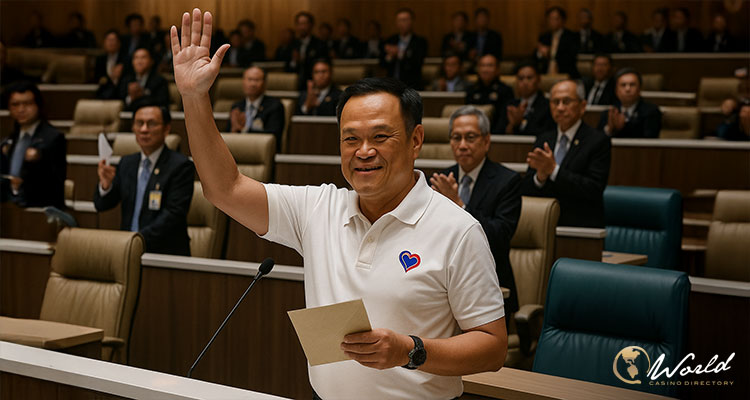Thailand’s House of Representatives has selected Anutin Charnvirakul, leader of the Bhumjaithai Party, as the nation’s 32nd Prime Minister. The vote on Friday, September 5, ended weeks of political uncertainty following the dismissal of Paetongtarn Shinawatra. Anutin, widely recognized for his firm opposition to casino legislation, received 311 votes out of 490, defeating Pheu Thai Party candidate Chaikasem Nitisiri. Another 27 representatives abstained from voting.
New Leadership in Thailand
His election required the support of at least 247 lawmakers to pass the constitutional threshold. According to Inside Asian Gaming, the decisive backing came from the opposition People’s Party, whose 143 members ensured Anutin’s victory. Under their arrangement, the People’s Party will not take up ministerial positions and insisted that parliament be dissolved within four months to allow fresh general elections.
The leadership change follows last month’s Constitutional Court ruling that removed Paetongtarn Shinawatra from office on ethics charges related to a phone call with former Cambodian leader Hun Sen. Her ouster marked the fifth time since 2008 that a Thai Prime Minister has been forced from office through judicial or legal intervention.
For Thailand’s gaming policy, Anutin’s rise is seen as a turning point away from legalizing casinos. Both Bhumjaithai and the People’s Party had fiercely opposed the Entertainment Complex bill proposed under Shinawatra’s government. The bill sought to introduce integrated resorts with casinos, but Anutin criticized the policy and claimed it had discouraged Chinese tourists from visiting Thailand. His lobbying was instrumental in having the legislation withdrawn from the House agenda in July.
Industry commentator Daniel Cheng, a former casino executive, said that Anutin’s election effectively shelves the idea of casino legalization. “You can pretty much move the entertainment complex [bill] to the bottom drawer and lock it up for the next half year; and if I were a betting man, don’t count on an early sequel,” Cheng said.
Cheng added that Thailand’s new political climate leaves little chance for the proposal to return soon. “The pundits can pretty much go on holiday until March next year when the new government is elected. That it isn’t going to be Pheu Thai is almost a foregone conclusion, and I will be the contrarian to hopeful casino investors that it is a good thing.” He argued that Pheu Thai’s handling of the bill had “steered what had been a positive initiative down a dark narrow tunnel to a mutually assured destruction of both bill and party.”
According to Cheng, only significant shifts—such as sustained economic struggles or influential political figures reviving the idea—could bring casino legalization back into discussion before 2030. He warned that any progress would require cooperation across political divides and likely a national referendum. “Simply put, it needs to be a multi-partisan effort” for legalization to succeed, he explained.
Anutin’s Political Path
Anutin, who turns 59 on 13 September, is the son of former Interior Minister Chavarat Charnvirakul. He studied engineering at Hofstra University in the United States and later completed a Mini MBA at Thammasat University. His career in politics began in 1996 as an advisor to the Foreign Minister.
He later served in ministerial positions under Thaksin Shinawatra’s government, including as Deputy Minister of Public Health and Deputy Minister of Commerce. In 2012, he succeeded his father as leader of the Bhumjaithai Party.
Despite his party previously joining Pheu Thai in coalition in 2023, Anutin withdrew support earlier this year over allegations against Paetongtarn Shinawatra. Now, he becomes Thailand’s third prime minister in just two years, with his formal appointment by King Maha Vajiralongkorn expected within days.


